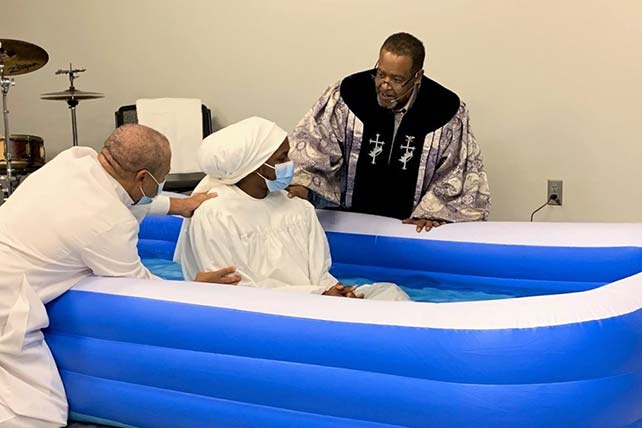TARRANT, Ala. (BP) – Amos Crews, senior pastor of new merger Pillar of Hope Church, took a drive through the deteriorating Tarrant community that is the church’s newfound home.
“This community, quite frankly, looks like a war zone,” Crews told Baptist Press. “Abandoned properties, burned out houses. And our wheelhouse of ministry has been the hopeless, the helpless, those folks (some) would cross the street to get away from.
“That was who Jesus reached out to throughout His ministry, was the least of these. Those are the people when they receive Christ, run the hardest for Christ. And they deserve to know the goodness of God and a second chance in life, and that’s what we do.”
Crews was drawn to the neighborhood because Robinwood Baptist Church is closing its doors Dec. 18 after dwindling to about seven active members, all retired and some with challenging medical issues. Robinwood is deeding its building to the Birmingham Metro Baptist Association (BMBA), which will in turn sell it to Pillar of Hope at a deep discount and establish a fund for the building’s repair and upkeep.
RELATED: 12 Questions for Pastors in Churches Needing Revitalization
“Tarrant is one of the most impoverished communities in Jefferson County, Alabama. It’s in bad shape,” Crews said. “While many would run from this community and its people, God has given us a great vision to love, reach and serve the least of these.”
John Roland, a Samford University advancement officer serving as Robinwood’s interim pastor, said the church realized it could no longer meet the community’s needs.
“We’re going to cease to exist,” Roland said of Robinwood. “We’ve decided the need is so big in that community, we just can’t reach it. The church is surrounded by 60 vacant properties … made up of drug dealers; they have a really high rate of registered sex offenders – I know it’s over 30 – that surround the church.
“These senior adults have given their blood, sweat and tears. The only thing that would prevent them from continuing is just their health.”
Adding to the community’s woes is a decades-long battle over environmental pollution from the iron and steel industry that gave Birmingham the name of “Magic City” in the 1800s. Many of the plants that manufacture coke, or hard coal, a main component in the manufacture of steel and iron, have closed, but the ABC Coke plant owned by the Drummond Company remains active in Tarrant. The pollution has driven many away from the town of 6,000; those who remain suffer a 32 percent poverty rate, according to City-Data.com.
Most recently in 2019, an agreement including a $775,000 settlement and emissions monitoring was reached to address cancer-causing benzene pollution from ABC Coke, but environmental activists have called it inadequate.
Josh Cook, BMBA church revitalization specialist, has worked with the churches to smooth the transition. He said the need for revitalization is becoming more common, especially after the slowdowns suffered during the COVID-19 pandemic.
“What we’re seeing, at least here in Birmingham, is that there are a lot of churches in communities that, the communities have transitioned, and the churches are struggling to reach the people in the community,” Cook said, “and they see it as almost a failure to stop existing as they are as a church, even though they’re not being really effective.
RELATED: Alaska Church Revitalization Result of Letting God Work, Pastor Says
“What we’re trying to go is get them to see it’s not a failure to hand off your church to somebody else. That it is just the natural process of the body of Christ as Christ works from one church to another,” Cook said. “We talked to Robinwood and they finally came to the place where they would rather see a vibrant church there, than to continue on until the last person turned out the lights.”

